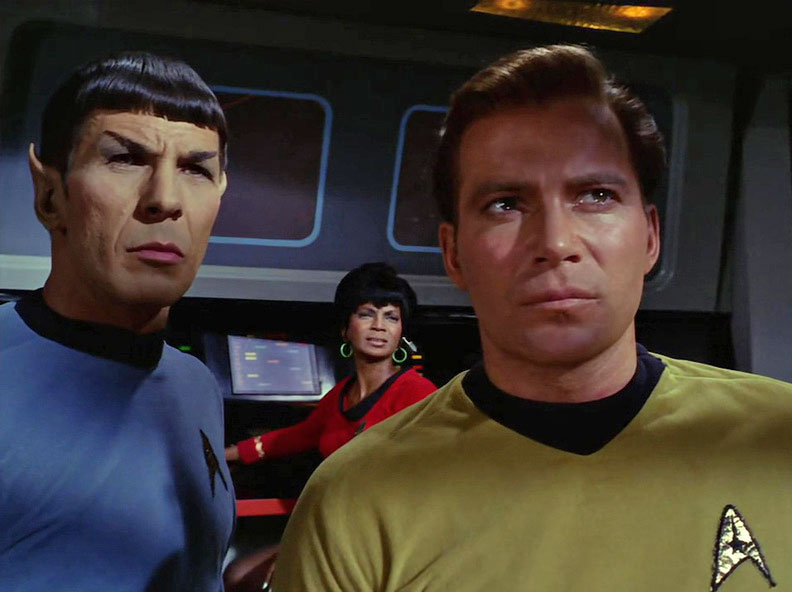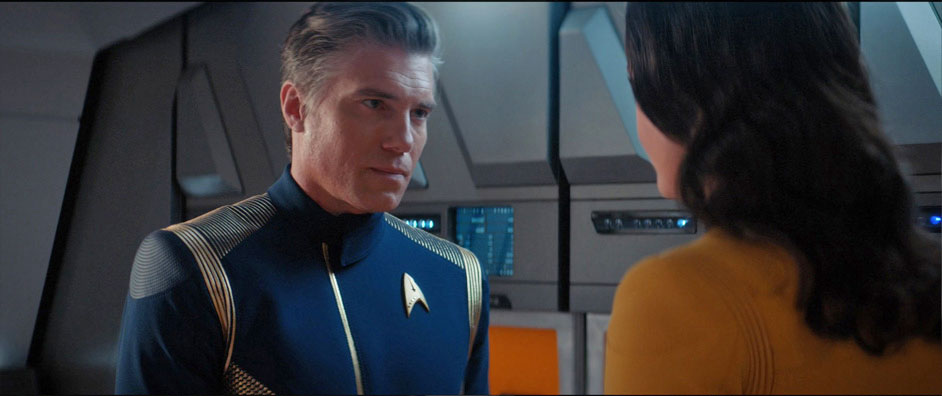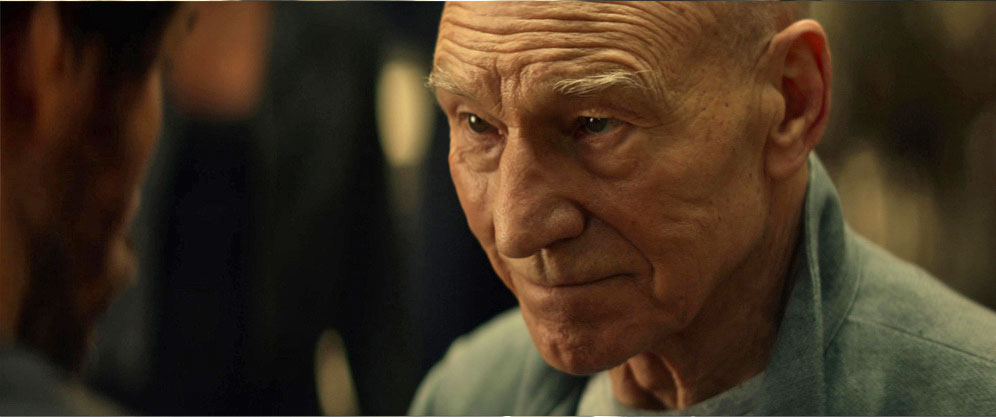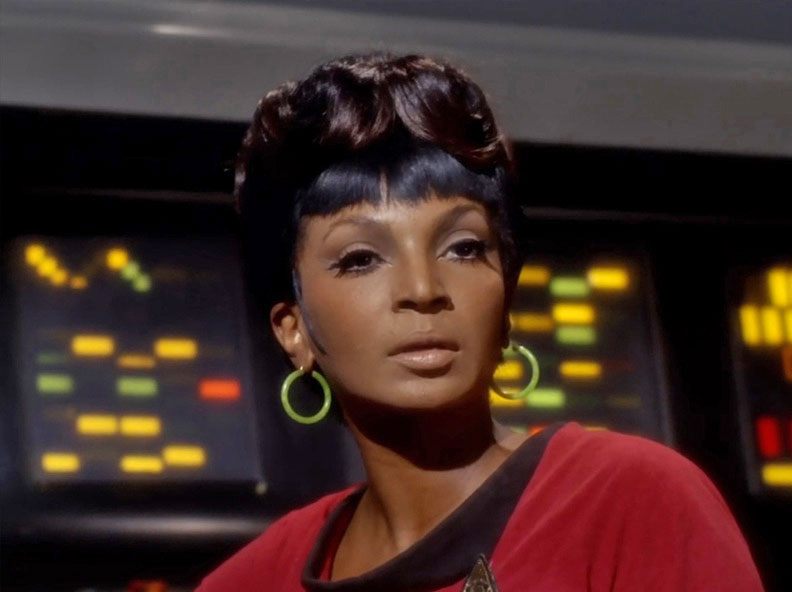| |
“Perhaps we have reached an age when the creative soil is infertile and incapable of nurturing and sustaining originality, birthing only dim echoes and shadows of what once was great, served up to those that know no better and therefore can issue no dissent.” |
| |
Dr. Roger Korby, Planet EXO III
The Pasteur of Archaeological Medicine |
Preface:
Generation gaps are all too real. I was a child of the sixties so my first exposure was to the blessed triumvirate of Kirk, Spock and McCoy. Too young to grasp the spectres of diminishing budgets, dodgy sets and a dearth of quality writing culminating in a below par third season, I lapped up every episode of Trek whenever the BBC screened them. As an older fan I recognised the show’s limitations but once the torch was passed to Picard and co. (despite a woeful first season) I hopped on board relishing in the joyous future envisioned by Roddenberry and The Next Generation. This was smart, ethical television that dared to suggest that we had a future as a species. Not too sure about that these days. Today’s Trek (Discovery, Picard and Strange New Worlds) is still - or so show runner, writer and co-creator Alex Kurtzman tells us - made with passion and enthusiasm and even love. I can grant that. But that’s not the issue. One aspect of the original the makers have tried to retain is the concomitant reflection of 21st Century issues just as original Trek commented on the social and military ferment of the late 60s. But whereas Kirk and Picard and company led with strong narratives, the social comment seems to be at the apex of the ambition of new Trek. With a disregard for anything approaching good science, and slavishly attaching new characters to old as a pitiful pretext of Trekian authenticity, something is definitely missing. It’s Trek, Jim. But not as we know it. I’m not sure I identify what that missing ingredient is but putting your finger on something so ineffable is always tricky. Perhaps that generation gap is more of an abyss…
Imagine if you will, a simple recipe from 1966. The potential final dish is the culmination of the right amount of ingredients mixed in the intended way and cooked with careful supervision. Too much of one element or too little unbalances the whole. Too much heat overcooks and too little makes the dish unpalatable. This particular dish faltered at its inception but is now world renowned despite a lack of resources during its creation. What is deeply understood today of the success or core DNA of this fifty-six year old recipe remains, alas seemingly elusive. It means that sincere, well-meaning but ill-equipped chefs are free to reinterpret the recipe according to their own society’s concerns of today and the fluid social situation in which they find themselves. In short, what made the recipe distinct is now subject to revision by people who seemed to have misunderstood what made the original recipe so gloriously special in the first place.

My own unease set in with the new chefs’ ambitious re-tweaking of the recipe, in 2009… Taking full advantage of the built in global fan adoration and firmly established cultural phenomenon that is Star Trek in TV and in film, Star Wars fan – note, Star Trek sits lower down on his preferred cultural icons list - J. J. Abrams, took the helm of a reboot of the cinematic series. There were things to like in the reboot (though why the Enterprise engine room looked like a brewery is beyond me) but there were so few original ideas. They were putting a shiny gloss on what had come before. Scientific mistakes or so-reasoned ‘dramatically justified derailing of scientific facts’, really bugged me considering how careful the original series had been in observing the laws of the Universe. Chekov manages to beam up a falling, flailing Kirk and Sulu, as they plummet at 122 miles per hour. As they lightly land on the transporter pad as if dropped from a six inch shelf nearby, I sighed deeply. What kills you is not the contact with the ground but the sudden stop. On the pad, there should have been a far from delicious blend of Kirk and Sulu pâté. Sigh. And they blew up the planet Vulcan in the first act – billions dead, classy, J. J. – and established what’s known as ‘The Kelvin Timeline’ named after the ship that Kirk’s father sacrificed in Act I. This meant that no end of cake could be had and devoured ad infinitum. The new chefs no longer regarded Trek canon as canon, just cannon fodder or works to pluck from, under the guise of homage. This wasn’t the ethos of Roddenberry charting new voyages. It was the all too familiar with a CG gloss. ‘To boldly go where no man has gone before’ was subtly altered to ‘to timidly venture where Star Trek has gone many times before and done better in the past… with added CG gloss.’
The second film was even more egregious at stealing from the original series and one tiny aspect, a moment at the penultimate climax, made me throw up my hands in acute frustration. The Enterprise is battling an enemy craft and right behind the battle is the Moon. The Moon is, at its closest to Earth, 226,000 miles away and at its furthest, 251,000 miles away, a mere hop, skip and a jump at Warp 1. In a few cuts we go from Kahn’s ship partially blowing up after attacking the Enterprise which is now a powerless hulk in space. Even auxiliary power is down. If you have no power and you are in Space near the Moon, you stay in position until another force acts upon you. Space is a vacuum. The Enterprise is going nowhere. Kirk says hullo to Bones and before you know it, Earth’s gravity is pulling the Enterprise into the atmosphere. Said ship and atmosphere are a quarter of a million miles apart! This is the contempt (there must be a kinder word but alas) the filmmakers must have for the audience – nothing new there – and the source material. Writers Roberto Orci, Alex Kurtzman – and we’ll be coming back to him shortly – Damon Lindelof and J. J. Abrams all know that the moon is more than 60 miles away from the Earth, don’t they? In 33 seconds of screen time, we establish the powerless Enterprise is dead at the Moon to the ship falling to Earth, 250,000 miles away. This isn’t lazy, it’s just really bad storytelling but they know with all the sound effects and music and fast cutting, there are precious few able to say “Uh, hang on…” and take them to task for it. At the very least, the filmmakers just don’t seem to care. To compound this disregard of basic physics, the damaged enemy ship manages to crash on Earth after being disabled at the Moon. So that was cinematic Trek off my radar. I won’t even start in on Star Trek Beyond. Well, OK. One thing, a quote from my review at the time:
“In interviews, Pegg almost defiantly says and I'm paraphrasing "We have an original bad guy not a Trek re-tread." That would be cool if it were not for six things. The villain is a humanoid lizard-faced antagonist (seen that before). He's not what he seems (and that). His hordes of anonymous soldiers fire green laser guns (seen that too). He's after the key to ultimate power (my jaw starts getting Axminster burns now). He wants to kill everybody (oh, please)... The evil thing that kills every one is a swirly mess of CG digital pokery which visually has been done to death (sorry) and finally (number seven if we are counting) what a fecking waste of Idris Elba.”
You have one of the greatest storytelling formats of all time… a powerful spaceship that can go anywhere in the Universe and the films actively avoid actual exploratory trekking. Bad Trek shows the limits of filmmakers and writers. There’s a Universe out there. What a playground! But if Trek was going to be changed irrevocably into something it never had been, then get that glitterball out, because Disco is here…
I have to say I was quite excited and ready to accept Star Trek again after the last series in production, Enterprise – one that I never watched – ended in 2005. To be honest, from my perspective, Deep Space Nine was the last quality Trek series. I slavishly bought each month’s VHS Voyager releases but I found that series something of a slog. My investment had waned by then… Trek overload? The only Trek show that I watched recently as a guilty pleasure was one that had The Next Generation writers installed and that was Seth McFarland’s The Orville. How Roddenberry’s estate didn’t tie him up with lawsuits for a decade is quite beyond me. But despite its crude humour (this is Seth ‘Family Guy’ McFarland after all) it’s an earnest attempt at bringing back the ethics of Treks long since passed. His regard and love for the show meant he’d come closer to the original in tone with added humour that you either accept or don’t. All of this begs a question – with an all too obvious answer. Why didn’t Kurtzman and co. create a stand-alone science-fiction show called Discovery, populate it with the same characters, have them have the same adventures with their light year hopping mushroom technology and push every message they wanted to with no crushing disappointment from the fans of original Trek? You’re way ahead of me. Having the name Star Trek is really the whole point. That’s a built in audience of millions, right there. But while Kurtzman may have attracted a loyal fan base outside of Trekdom, he and the studio wanted to snare idiots like me who had to tune in to anything with the name Star Trek attached to it. Except that I didn’t. I let the short shows go and manoeuvred around Lower Decks like Tony Curtis in The Great Race’s custard pie fight. Simply not interested.

Star Trek Discovery began its run in 2017. It seems that Star Trek is an enormous marquee held down by thousands of guy ropes. If it ever broke free of those attachments to what it was, it may even become interesting and soar again but as soon as I found out that Michael Burnham was Spock’s step-sister, I sighed. Again. Same old, same old. And Sonequa Martin Green, while a perfectly good actress, just doesn’t have the star-wattage or charisma to helm a Star Trek show from my point of view. This is a very subjective opinion as we click with some actors/characters and we don’t with others. There wasn’t a lot of clicking going on, on the Discovery bridge crew either. It certainly didn’t help that Michael Burnham became what YouTube’s Critical Drinker dubbed ‘Diverse Female Space Jesus’, a character who was so perfect, a ‘Mary Sue’, that she bored me to distraction. It also drained a lot of goodwill having the Klingons guttural barks delivered so slowly. I was happy to leave them behind. And again, the dismissing of basic scientific principles time after time (the spore drive all but obliterates Kirk’s subsequent adventures. Where was his spore drive?) but what Discovery did that really pushed me to the very outskirts of being able to bear this new iteration, was to destroy the United Federation of Planets. They literally destroyed every starship in the Universe (apparently they were all in one place in Space at the time) because an alien was having a psychotic episode on a planet made of the stuff that powered those starships. What? I mean, what?
The bedrock of Star Trek, the United Federation of Planets and Starfleet, was obliterated on a 2020 whim by writers of a show that had zero respect for what the UFP stood for. Star Trek was about inclusion, tolerance and respect for alien life and the very basis of that philosophy was embedded in Starfleet, humans and other extraterrestrial races together working towards an inclusive Universe. IDIC was Mr Spock’s philosophy, ‘Infinite Diversity in Infinite Combinations’. I suspect this aspect made it very attractive to exploit the perceived causes célèbre of the issues of the day, diversity in all its forms - or as the Critical Drinker announces with a sepulchral echo - ‘The Message’. I fall back on the old cliché once allegedly coined by studio mogul Sam Goldwyn; “If you want to send a message, use Western Union.” Movies and TV have to entertain first. The sending of messages, if subtle, can be hidden in the narratives but you have to have compelling narratives first. Once you have your dramatic template, weave in whatever message you want. The original Star Trek was a single man’s vision – producer Gene Roddenberry. It may surprise you to learn that Discovery’s Season 3 producer credits number (sigh) 22!
Star Trek Discovery has had an easy ride from critics and there are many aspects of the show that are superlative. Of course a show set a decade before the original series is not going to ape the design of that limited production with the ships as exceptions. Don’t screw around with the classic Enterprise design. Anson Mount as Capt. Pike excelled himself in Season 3 and was given his own spin off show simply generated from the charisma of the actor and the overwhelmingly positive responses from the fan base. Fans know a great fit for Trek when they see one. So, quite understandably, I am actually scared to go anywhere near it. Discovery looks amazing and the effects are sometimes way too much for that TV frame. But all this today is de rigueur. The other aspect that varies from the original is the story arcs. Each season constitutes one story told in a dozen hours or so give or take very few stand-alone episodes that are still connected to the big story. I miss the days of stand-alone adventures, an old fashioned complaint perhaps. Maybe we’ve just grown out of that kind of storytelling. While puzzlingly hailed by critics, Discovery has a very un-fresh average audience score of 37% not that anyone can gather any great meaning from that so perhaps that’s a low blow. It’s certainly low. Apologies. Perhaps its fans have found meaning in the message(s) but if there’s one show that’s done more harm to the legacy and promise of Star Trek, it’s come from the unlikeliest of sources as this man would have to have agreed to make the show as his character’s name is in the title.

Originally an elderly Patrick Stewart turned the show down but something changed his mind and I cannot imagine for the life of me it was the scripts. Apparently it was a 36 page outline as revealed in an interview with him in The Guardian. The writers don’t seem to have watched The Next Generation. But the differences in the character from his 50s in The Next Generation to his 80s are probably what led Stewart to play the part again. He was presented with different character aspects to explore. Let’s ignore that while age does change us, surely not at our core? Either way both seasons 1 and 2 feel oddly anti-Federation and Starfleet. In the new writers’ hands, the Federation is peppered with idiotic commanders and highly placed spies and I suppose Picard had to come into conflict with Starfleet given he’s not a member anymore but still. In the first season, his main bone of contention is that Starfleet abandoned a rescue mission, something Starfleet of old would never have done. But hey, drama has to have conflict. Data (blown to smithereens in the underwhelming Star Trek: Nemesis), was never Picard’s friend and now he’s dreaming of him and paintings he completed of a mysterious girl who… oh God. The grimness, nihilism and gratuitous violence of the show shatters Gene Roddenberry’s original vision of a human race with a bright future into shards of sharply abandoned hope and discarded potential.
I endured season 2 hoping that Q would liven things up. He must have had a measly six minutes of screen time over the entire 10 episodes. The absurd and utterly ridiculous behaviour of the characters in this season have done what few Treks have ever done. OK, I couldn’t even get past Enterprise’s theme song but I’ve not been repelled by a Trek iteration as much as by the characters’ stupidity in season 2. I tell a lie. I watched Discovery season 4’s opener for 8 minutes and that was it. I’m done with new Trek. Perhaps this is a generational thing and perhaps there is a whole host of Next Generation fans out there lapping this up… Rotten Tomatoes again, 86% critical approval up against a 41% audience score. No idea what that actually means but heaven help us, Disco Season 5 and Picard Season 3 are on their way… I just won’t be watching. One of those folk, like myself, with the same complaints, floated a rumour that many positive online reviews of these shows were probably written by bots under orders from the powers that be.
For more entertaining Trek related content, look no further than Red Letter Media’s Mike Stoklasa and Rich Evans’ eviscerations of the new shows on YouTube as well as hours of love shown for the older shows. Stoklasa is clearly an original series and TNG fan and sees new Trek through the same far from rosy lens as I do. Also good for a laugh is Critical Drinker’s response to both Discovery and Picard. These are smart critics who know what matters in good drama delivered by their self-styled faux personas for that extra bit of entertainment value. As someone on the same wavelength but a little more willing to go for the jugular, here’s Slade Hale from Bounding Into Comics and his review of Season 2 of Picard here.
“Unfathomable garbage… Perhaps the greatest travesty in Star Trek history. Picard recently unleashed its second season on its casual audience, whilst seeking to undermine and destroy the franchise’s roots, as is standard fare with everything related to Alex Kurtzman these days…”
“Star Trek died the moment Discovery hit the airwaves, but season 2 of Picard feels like vengeful spite on the part of the writers, who are trying their best to glass everything the franchise stood for.”
RIP Star Trek. It’s been almost a lifetime of great popular art while it lasted. I only just realised that my relationship with Star Trek is probably the longest-lasting relationship I’ve ever had with anything. To split up with it should be painful but Alex Kurtzman has made that parting of the ways extremely easy. I wish him and his cohorts well but maybe I’m just not the demographic anymore.
Thank you, Gene et al for all you’ve given me. Your work has enriched my soul and I don’t care how ridiculous that sounds.
As a short postscript, I have to say that if human perfection was ever attainable, it would look a lot like Nichelle Nichols in 1966. I’ve been quietly in awe of her for almost fifty-six years…

|